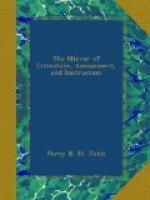In modern times, the esteem for figs has been still more widely diffused.
When Charles the Fifth visited Holland, in 1540, a Dutch merchant sent him a plate of figs, as the greatest delicacy which Ziriksee could offer.
H.B.A.
* * * * *
ALNWICK FREEMEN.
Alnwick, in Northumberland, is remarkable for the peculiar manner of making freemen. Those to be made free, or as the saying is, to leap well, assemble in the market place early on St. Mark’s day on horseback, with every man a sword by his side, dressed in white, all with white night caps, attended by four chamberlains mounted and armed in the same manner. Hence they proceed with music to a large, dirty pool, called Freeman’s Well, where they dismount, and draw up in a body, and then rush through the mud as fast as they can. As the water is generally very foul, they come out in a dirty condition; but after taking a dram, they put on dry clothes, remount their horses, and ride full gallop round the confines of the town, when they return, sword in hand, and are met by women decorated with ribands, bells, &c. ringing and dancing. These are called timber vasts. The houses of the new freemen are, on this day, distinguished by a holly bush, as a signal for their friends to assemble and make merry.
This ridiculous ceremony is attributed to King John, who being mired in the well, as a punishment for not mending the road, made the above custom a part of the charter of the town.
H.B.A.
* * * * *
THE ANECDOTE GALLERY.
* * * * *
DOCTOR PARR.
How many a fine mind has been lost to mankind by the want of some propitious accident, to lead it to a proper channel; to prevent its current from “turning awry and losing the name of action!” We know not whether the story of Newton’s apple be true, but it may serve for an illustration, and if that apple had not fallen, where would have been his Principia? If the Lady Egerton had not missed her way in a wood, Milton might have spent the time in which he wrote “Comus,” in writing “Accidence of Grammar;” and if Ellwood, the quaker, had not asked him what he could say on “Paradise Regained,” that beautiful poem (so greatly underrated) would have been lost to us.
Samuel Parr was born at Harrow-on-the-Hill, June 15 (o.s.) 1747. He was the son of Samuel Parr, a surgeon and apothecary of that place, and through him immediately descended from several considerable scholars, and remotely (as one of his biographers, Mr. Field, asserts) from Sir W. Parr, who lived in the reign of Edward IV., and whose granddaughter was Queen Catharine Parr, of famous memory. It does not appear from Parr’s writings (as far as we remember) that he laid claim to this high ancestry;




